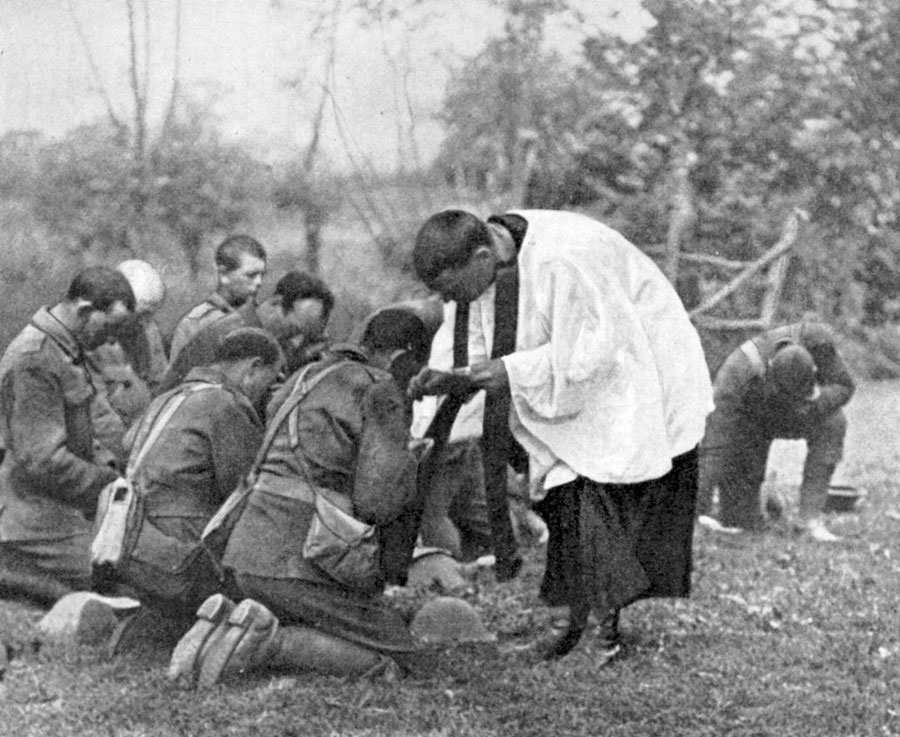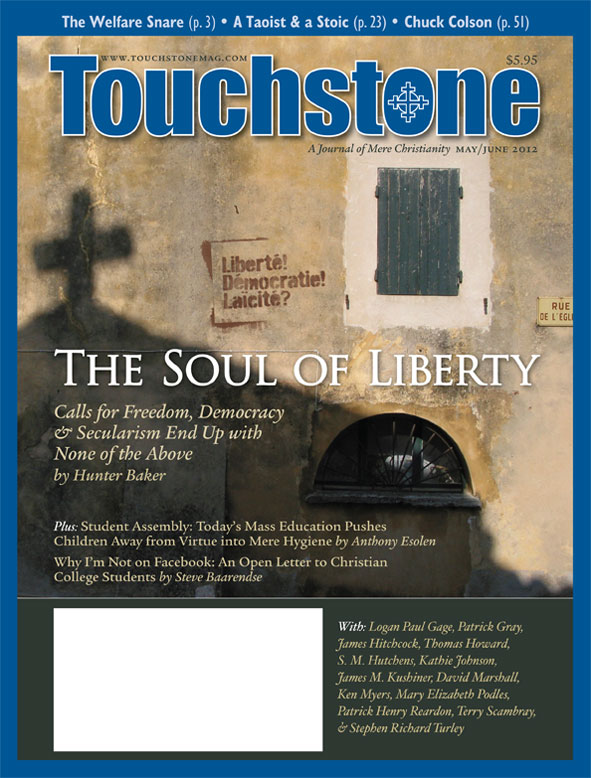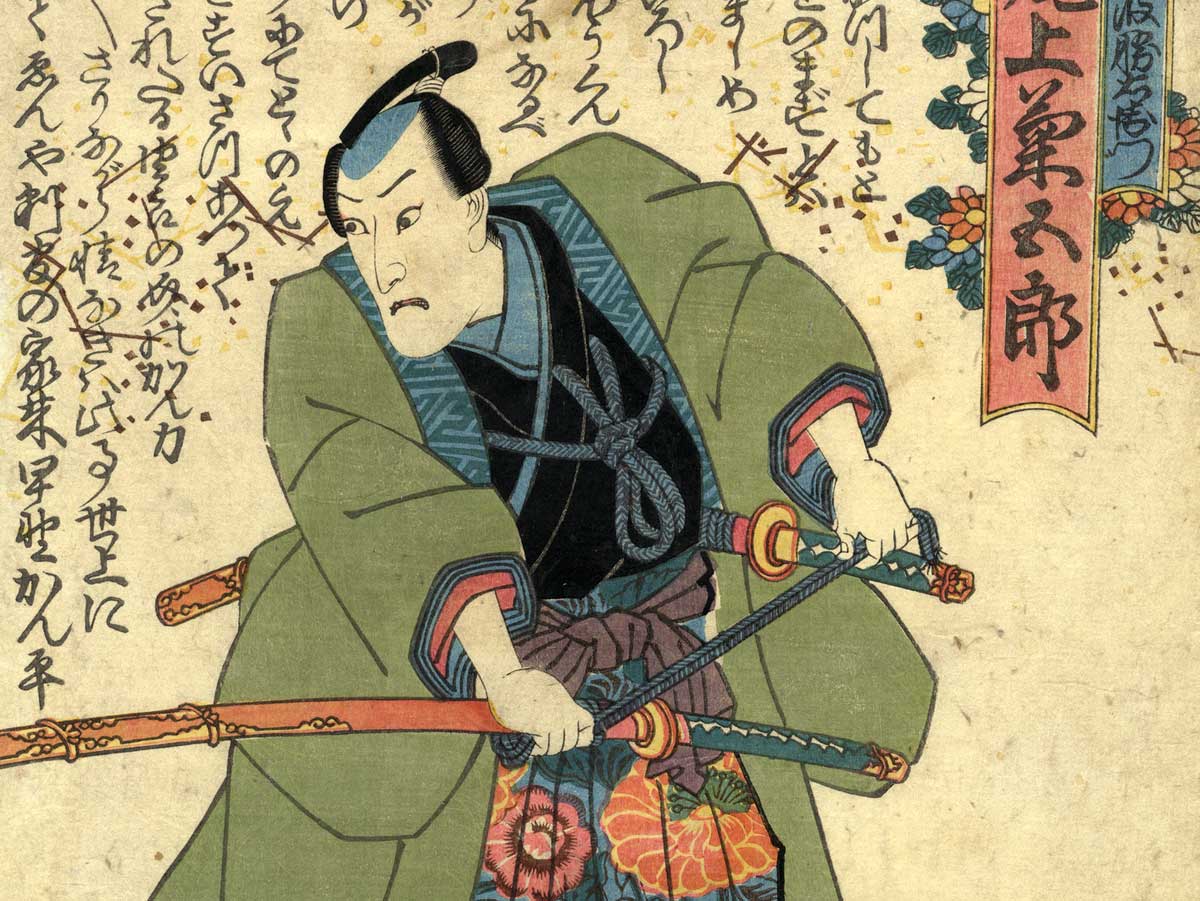Mars Hill Travelers
David Marshall on a Taoist, a Stoic & the Awareness of God
Richard Dawkins may have made life a little too easy for Christians. The God Delusion seems like one of those Potemkin villages, complete with abandoned Buicks, that the army used to set up to measure the velocity at which rubble is wafted horizontally after a nuclear explosion. The ideas in his atheistic assemblage, poorly constructed to begin with, and long since discarded by theologians, philosophers, and historians, serve temptingly as targets. Like all that induces sloth, the “New Atheism” may be bad for our souls.
Dawkins does sometimes raise interesting questions, though. One of the most interesting has to do with what G. K. Chesterton called “God and Comparative Religion.” Dawkins wrote:
Not surprisingly, since it is founded on local traditions of private revelation rather than evidence, the God Hypothesis comes in many versions. Historians of religion recognize a progression from primitive tribal animisms, through polytheisms such as those of the Greeks, Romans, and Norsemen, to monotheisms such as Judaism and its derivatives, Christianity and Islam.
The general theory of religious evolution articulated here goes back to Edward Tylor, the nineteenth-century Father of Cultural Anthropology, whose Vancouver Island totem poles adorn the Pitts River Museum a few minutes’ walk from Dawkins’s home in Oxford. But the view of “primitive” religion upon which it is built echoes David Hume’s Natural History of Religion: “Behold then the clear testimony of history. The farther we mount up into antiquity, the more do we find mankind plunged into polytheism.”
Hume seemed especially offended by the notion that, while the Greeks in all their wisdom remained largely polytheist, the unlettered “ignorant and barbarous” might have somehow found out about God.
Awareness of God
Scandalously, it turns out that many had. In the nineteenth and early twentieth centuries, tribal bands around the world informed surprised missionaries and anthropologists that, yes, they knew about (or had almost forgotten) a good, creator God, who should not be worshiped with idols. Sometimes, the natives waved off foreign names for God and told the missionaries, “You must mean uNkulunkulu!”
Andrew Lang, a student of Tylor’s, whose books on fairytales can often still be found on the children’s shelves of public libraries here in Seattle, put the pieces together in a book called The Making of Religion. Chesterton almost certainly read that book.
In The Everlasting Man, Chesterton argues that religion should not be defined “vertically” or “geographically” into the great traditions that have evolved in different parts of the world, but “horizontally” or “psychologically” into four elements: God, the gods, philosophy, and “the demons.” These elements, he claimed, could be found almost everywhere.
The idea that awareness of God would be found in different cultures was not new, of course. Following St. Paul, Augustine predicted in City of God that a high theism might be found among “sages or philosophers” whether you go east, south, north, or west.
Confirmation of this ancient expectation can be found not only among primitive bands in the Outback, the Great Rift Valley, and the foothills near Yosemite, but also in the writings of two great philosophers on different sides of the world, from within what are often described as “pantheistic” religions. Both, as it happens, wrote about God from the perspective of disabled men who (like Job) exhibited great faith. One was that Chinese dreamer and spinner of yarns, Zhuang Zi, the second founder of the Taoist school. The other was a first-century Roman slave, Epictetus.
Zhuang Zi’s Parable
Zhuang Zi (the Chinese “zi” is pronounced “dz”) told of a conversation between four friends named Zisi, Ziyu, Zili, and Zilai. One remarked laconically, “Who can know how death and birth, survival and disappearance, go into forming the human body? That is the person I’d like to make friends with.”
The four friends looked at each other and laughed. Not long after, Ziyu, a hunchback with severe physical infirmities, fell ill. Dropping by his house, Zisi found him in a philosophical humor:
“Alas that the Creator should have made me the deformed object that I am!”
“Do you dislike your condition?”
“No, why should I dislike it? If he were to turn my tailbone into a wheel, and my spirit into a horse, I would mount that horse, and want no other steed.”
One cannot fight heaven, Ziyu concluded in a tone more hopeful than resigned, or even flippant.
Zilai fell ill next. With his wife and children standing around him, he gasped for breath, but retained his wit. Zili came calling, brushed the family aside, and blurted out his despair with a bedside touch that would have embarrassed Job’s friends: “Great is the Creator! What will he make of you next? The liver of a rat? The arm of an insect?”
Zilai responded serenely: “Whether a parent tells a son to go east, west, south, or north, the son follows their command. Yin and Yang(the constituent elements of the Dao) are more to a man than his parents. If they are bringing about my death, I will not be obstinate and resist.
“Consider a great founder, casting his metal. If the metal were to leap up and say, ‘I must be made into a Mo Ye sword,’ the founder would see that as uncanny. . . . When once we understand that heaven and earth are a great melting pot, and the Creator a great founder, where can we be required to go that shall not be right for us? We are born as from a quiet sleep, and we die to a calm awakening.”
In some ways this conversation typifies Zhuang Zi’s style: he is one of the world’s great tellers of parables, with ironic and often grotesque comic sense. The twentieth-century literary giant Lin Yutang regarded him as the best fiction writer China had ever produced.
But oddly, this parable comes from a tradition often understood as pantheistic, and that later devolved into a search for immortality through drugs and magic. One does not hear much about “the Creator” (Zao Wu) in Chinese thought before this, though other theistic names, such as Shang Di and Tian, dominate the earliest classics. Indeed, Yuan Zhiming, a philosopher who played a role in the democracy movement in 1989, has since come to believe that Lao Zi himself, the founder of the Taoist school, was a theist, and that the “Dao” for which the school is titled referred in his enigmatic writings to a personal God. Yuan has been criticized by many scholars for this view, but I think there is something to be said for it.
But there is little talk in earlier Chinese writings about God as Creator—only a few vague suggestions in the oldest text, the Book of Poetry, that “Heaven gave us birth” or “Heaven made the hills.” So how did Zhuang Zi arrive at this intuition? And why did he so naturally put hope in God and in a “quiet awakening” into the mouth of a crippled old man of no apparent rank or importance?
Cleanthes’ Prayer
At about the same time, far to the West, another Axial Age teacher, Zeno of Citium, set up shop by the columns (stoica) of Athens’ marketplace. The Stoic school eventually focused on austere moral ideas, but it was also wedded to a belief that God and the universe were united, and that everything came to be through the work of a divine “artisan fire” reminiscent of the “Founder” Zhuang Zi wrote of.
Socrates was Zeno’s hero, as he was of the Cynics, from whom Zeno borrowed much thought. Stoics taught that one should be cheerful, not only in the face of hemlock, but also in the face of death by torture, even without hope for life after death. Zeno could be morose, but there is no denying the man’s intellectual fortitude.
It is generally thought that the Stoic God was too impersonal to hear prayers. Depending on your mood, Diogenes Laertius’s half-masticated biographical gloss, the main source for Zeno’s life, can be read as theistic, polytheistic, henotheistic, pantheistic, or (with effort) materialistic. One is startled, though, to find Cleanthes, who took over the school upon Zeno’s death, praying to “Zeus” in terms that, while occasionally evoking an old-fashioned thunderbolt or suggesting a cosmic animism, settle most often on what sounds like sincere theistic piety:
Most glorious of the immortals, invoked by many names, ever all-powerful, Zeus, the First Cause of Nature, who rules all things with Law, Hail! It is right for mortals to call upon you, since from you we have our being, we whose lot it is to be God’s image, we alone of all mortal creatures that live and move upon the earth.
Cleanthes added that the universe goes where “Zeus” leads it, that “all works of nature” came to be established by his “thunderbolt,” and that mortals will be happy if only they listen to “God’s universal Law.” This is not Homer’s Zeus; and he seems far more indecorously substantial than, say, than the “Real” of philosopher John Hick.
Epictetus’s Witness
The early-second-century Stoic slave Epictetus left no extant works, but his teachings were recorded (perhaps creatively) by his disciple Arrian. For Epictetus, God created all things, often with the good of man in mind. Humanity exists to act as “spectator” and “interpreter” of God and his works. And God is not just king, but patros. He “perceives” all things; indeed, it is impossible to conceal our thoughts from him.
Our duty is to sing hymns of praise and thanks as we plough and eat: “What else can I, a lame old man, do but sing hymns to God. . . . I will not desert this post, as long as it may be given me to fill it; and I exhort you to join me in this same song.” Epictetus also calls us to “bear witness” to God (using the same verb Luke so often uses for the same purpose in Acts), who serves as our “guide.”
However the Stoics may have resolved the tensions between the theologies of Socrates and Plato, Antithenes, Zeno, Cleanthes, and (later) Epictetus, when St. Paul met members of their school in Athens—in the very market where the school had been founded—he confidently appealed to their knowledge of a willful, distinct, loving creator God who would judge humanity. For all of these things were present in Stoic thought. Indeed, some of Paul’s words seem to echo Cleanthes’ poem. Furthermore, Paul’s understanding of human nature made it reasonable for him to appeal over the heads of Homer and Zeno to that which is “evident within them”—as did Stoics themselves.
As Christianity continues to spread in China, many are excavating “seeds of the word” from deep within the soil of this great and ancient civilization. As time passes, the “witness” of two lame old men of ancient times—the hunchback Zhuang Zi wrote of, and the Roman slave—may prove to have fallen on glad ears, and to have helped convert, and perhaps reconcile, two of the world’s allegedly (and often apparently) clashing civilizations.
David Marshall is the author of several books, including most recently, How Jesus Passes the Outsider Test: The Inside Story (Kuai Mu Press, 2015). He blogs at christthetao.blogspot.com.
subscription options
Order
Print/Online Subscription

Get six issues (one year) of Touchstone PLUS full online access including pdf downloads for only $39.95. That's only $3.34 per month!
Order
Online Only
Subscription

Get a one-year full-access subscription to the Touchstone online archives for only $19.95. That's only $1.66 per month!
bulk subscriptions
Order Touchstone subscriptions in bulk and save $10 per sub! Each subscription includes 6 issues of Touchstone plus full online access to touchstonemag.com—including archives, videos, and pdf downloads of recent issues for only $29.95 each! Great for churches or study groups.
Transactions will be processed on a secure server.
more from the online archives

35.4—Jul/Aug 2022
The Death Rattle of a Tradition
Contemporary Catholic Thinking on the Question of War by Andrew Latham
calling all readers
Please Donate
"There are magazines worth reading but few worth saving . . . Touchstone is just such a magazine."
—Alice von Hildebrand
"Here we do not concede one square millimeter of territory to falsehood, folly, contemporary sentimentality, or fashion. We speak the truth, and let God be our judge. . . . Touchstone is the one committedly Christian conservative journal."
—Anthony Esolen, Touchstone senior editor








